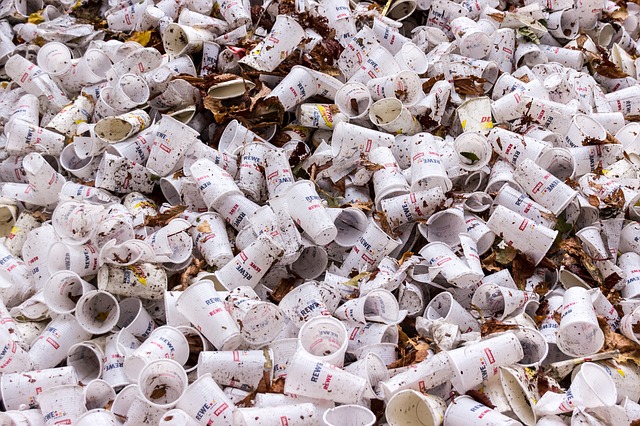
- Sustainable Planet -
- 4mins -
- 499 views
England bans 3 key single-use everyday plastic items
UK government confirms ban on plastic straws, stirrers and cotton buds in bid to reduce plastic waste.
England bans plastic straws, stirrers, and cotton buds
On May 22 the UK environment secretary Michael Gove confirmed a ban on plastic straws, drinks stirrers, and plastic-stemmed cotton buds in England, following overwhelming public support for the move. The ban, which will come into force in April 2020, will include exemptions to ensure people with medical needs or disabilities are able to continue to access plastic straws.
UK move a positive step in the right direction in the battle against plastic pollution
Over 80% of respondents to a consultation on the issue backed a ban on the distribution and sale of plastic straws, 90% a ban on drinks stirrers, and 89% a ban on plastic-stemmed cotton buds.
Registered pharmacies will still be permitted to sell plastic straws, over the counter or online, however restaurants, bars and other catering establishments will not be allowed to display plastic straws nor provide them automatically.
The government says it believe the measured strike a fair balance between reducing the environmental impact, while protecting the rights of people with medical conditions and disabilities who rely on tstraws. The government will carry out a rigorous check after one year to assess the impact of the measures and ensure the balance is correct.
In England alone, it is estimated that 4.7bn plastic straws, 316m plastic stirrers and 1.8bn plastic-stemmed cotton buds are used annually. An estimated 10% of cotton buds are flushed down toilets and can end up in waterways and oceans.
Environment Secretary Michael Gove said: “Urgent and decisive action is needed to tackle plastic pollution and protect our environment. These items are often used for just a few minutes but take hundreds of years to break down, ending up in our seas and oceans and harming precious marine life.
So today I am taking action to turn the tide on plastic pollution, and ensure we leave our environment in a better state for future generations.”
It is estimated there are more than 150m tonnes of plastic in the world’s oceans, and every year one million birds and more than 100,000 sea mammals die from ingesting plastic in one form or another, or from becoming entangled in plastic waste. A recent government report estimates that the quantity of plastic in the ocean is set to triple by 2025.
See below: European Council adopts new rules banning selected single-use items.
Source: Positive.news

European Council adopts new rules banning selected single-use plastic items
EU ADOPTS SINGLE-USE BANS TO TACKLE PLASTIC MARINE LITTER
The European Council has adopted new rules regarding single-use plastics across all member states, in an effort to reduce ocean pollution.— reports FoodNavigator
The legislation sees selected single-use products made of plastic—for which alternatives exist—banned across the bloc.
This includes cotton bud stems, cutlery, plates, straws, stirrers, and sticks for balloons.
The ban also covers single-use plastic cups, food and beverage containers made of expanded polystyrene, and all products made of oxo-degradable plastic. The Council has also implemented measures to reduce the use of food containers and drink cups made of plastic.
Member States will have approximately two years to instate the legislation into their national law.
A separate plastic collection target was also adopted. The EU aims to collect 90% of all plastic bottles by 2029—including a milestone target of 77% by 2025—and will introduce the design requirement to connect caps to bottles.
The Council also requires manufacturers to incorporate 25% of recycled plastic in PET bottles from 2025 and 30% in all plastic bottles as from 2030.
GERMANY URGED TO HALT THE 5,300 CUPS PER MINUTE ‘COFFEE CUP FLOOD’
A study revealing that 5,300 disposable cups are used per minute in Germany has prompted a call for governmental action.
The study, which was commissioned by Germany’s Federal Environmental Agency, found that 2.8 billion disposable cups were used for hot drinks in 2106, and a further 3 billion were used for cold beverages.
These figures equate to an annual consumption of 70 disposable cups per capita – 34 for hot drinks, and 36 for cold.
According to not-for-profit environmental and consumer protection association Environmental Action Germany (DUH), just a fraction of these disposable cups are recycled.
Coffee cups—which typically contain a mixture of paper and plastic in their inner lining to retain both heat and liquid—require more complex infrastructure to recycle than either material on its own.
To address this problem, DUH is demanding a levy of 20c be charged on disposable cups and 10c on disposable lids.
The association has also recommended the introduction of a mandatory reduction target of 70% by 2022.
DUH is also pushing for more action to favour the use of reusable cups. According to the study, a plastic reusable cup becomes ecologically superior to a disposable after approximately 20 refills. Reusable cups have a lifespan of at least 50 uses within one year.
Source: FoodNavigator.com

